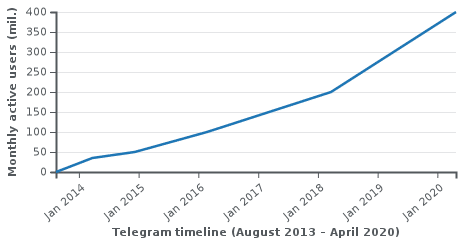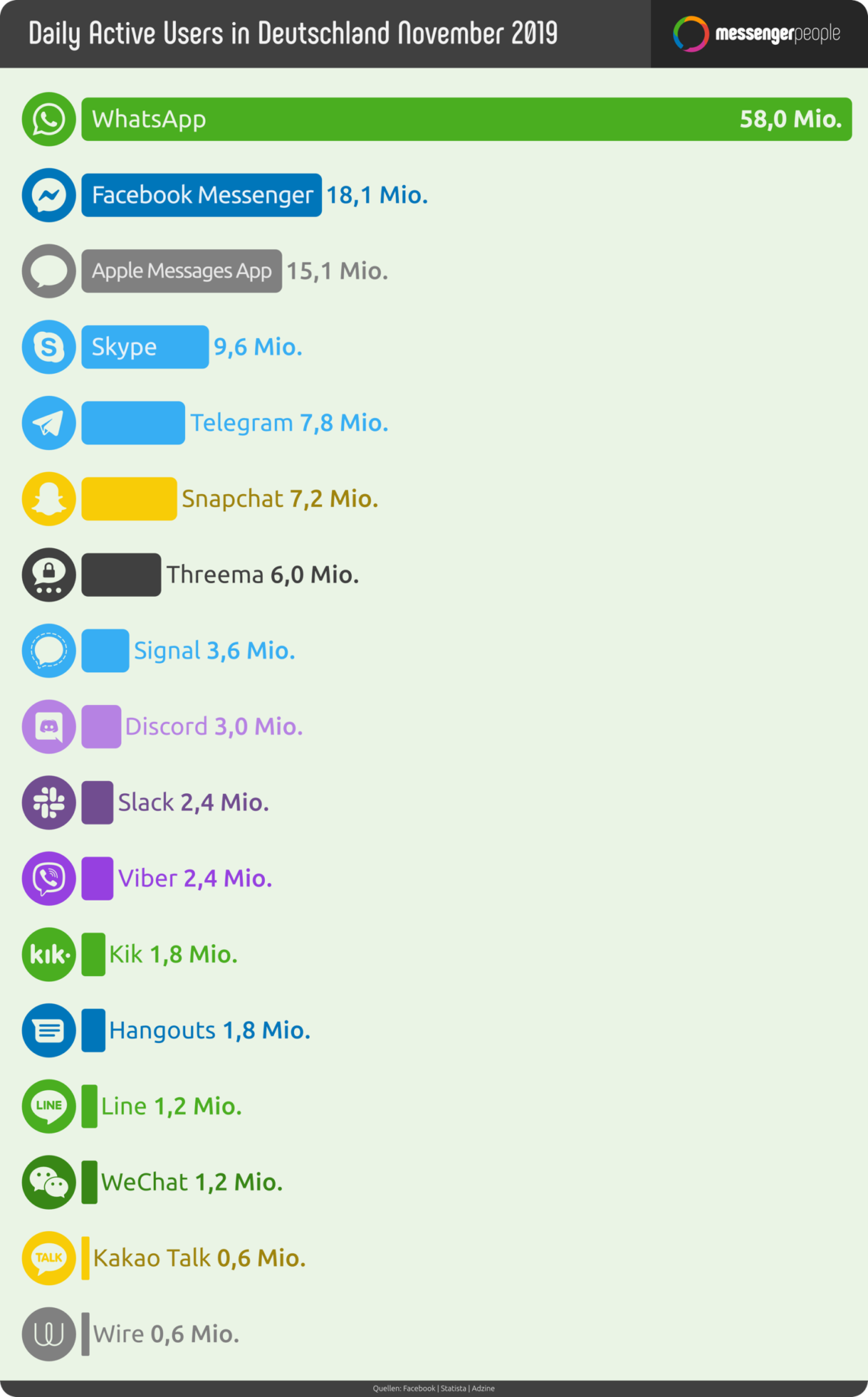Just a few years ago, Telegram was considered a harmless messenger in Germany. Many used the app as an alternative to WhatsApp. Especially the high anonymity and data security convinced many users. Internationally, the app even had the reputation of a protest app. Via Telegram, opposition members in countries with authoritarian regimes organized themselves worldwide;
It’s no coincidence that all these protest movements are using Telegram, of all things. The service not only offers end-to-end encryption and can be used reliably even with slow internet connections. It is also incredibly difficult to block.
The Russian brothers Nikolai and Pavel Durov are behind the Messenger service. Pavel Durov in particular is known for his eccentric personality.
A TechCrunch – Article or rather, a number in the same made me sit up and take notice. It was about the following facts: “Telegram, nearing 500 million users, to begin monetizing the app” 500 million users, that’s a lot of “wood” and all that somehow half under the radar.

Telegram is currently struggling with a dubious and disreputable reputation in Europe and is seen as the medium of lateral thinkers, political radicals and eternal yesterday (as well as by Jan Marsalek). Nevertheless, it is sometimes “cooler” than the mass-produced WhatsApp or the “digital natives thing” Slack;
But “who or what” is Telegram actually?
Here are a few facts:
Telegram is a “cross platform”, a cloud based instant messaging service with video call/phone call integration and channel functionality, some say “the better WhatsApp with some Skype integrated”. There is a strong focus on “Encryption” e.g. in the context of “End2End encrypted” calls and/or also the feature “Secret Chat”.
The frontend, however, comes across very “modern” and through strong integration of the stickers, it focuses on a more youthful target group (Sticker Directory ) (Instructions how to build your own stickers)
Founded in Russia in August 2013, Telegram quickly moved to Dubai amid rumors of “discord” with the Russian government over the release of data. This discussion partially gave Telegram the image of being “safe from state access”. And is therefore probably considered the favored medium for clandestine activities or illegal groups.
Impressive growth
Telegram often moves closely to the Borderline Censorship (as in Russia, Iran, etc.) and is used, among others, by extremist groups (see also the Extremism Tracker) and therefore probably makes it especially attractive for lateral thinkers and consortia. And so it quickly lands on the Privacy Watchlist.
Considering this social development of groups that are on the edge of legal activity, the growth of the Telegram medium is very impressive.
Here are some remarkable numbers about user growth (source: Wikipedia):

So Telegram is also to be taken quite seriously as a “WhatsApp chaser”. And here we come full circle to the GAFAS, which are all much more than just messaging. Nevertheless, they all have a messenger in the portfolio (just differently successful). Telegram is messaging only – and the only really big messenger without reference to a GAFA, but could moult into one from the pure user numbers.
In addition, there is a thoroughly interesting but also contentious Founderwhose interaction with Russia is not really transparent, but he displays the greatest ambitions.
https://www.forbes.com/profile/pavel-durov/?sh=5031e2f714c5
Because despite all his doubtfulness, Pavel Durov could well be someone who is seriously trying to break the US dominance alongside the Chinese. The financial mass is there (500 million users alone should represent a value of up to 5 billion), assuming of course that someone is willing to pay €10 per user, which does not seem too high, especially when you see the demonstrated scalability in conjunction with the robust technical base infrastructure.
(Funding) goals of Telegram
How Telegram has monetized itself so far or what the financing is concerned, this remained somewhat unclear until now and the cost base especially in tech & infrastructure may not have been insignificant. Financing all this out of the 3.4 billion from contact sales would be very risky, but was it all on the company’s own account? Probably in the long run it will come down to advertising (and paid features).
But what exactly is Telegram up to?
The founder, Pavel Durov, has made a statement about it himself: https://t.me/durov/142
To summarize:
(a) Business customers should pay
b) Admins of channels should pay
c) Advertising is somehow envisaged – but probably not in normal communication. “Communication between people should be free of advertising of any kind” – how exactly it is meant remains vague
d) There is talk of “pay stickers” – presumably similar to Instagram’s new “integrated” shop function – the “PayButton”.
https://www.golem.de/news/messenger-telegram-will-bezahlfunktionen-einfuehren-2012-153023.html
https://www.inside-digital.de/news/telegram-ab-2021-mit-werbung-und-kostenpflichtigen-inhalten

One of the first attempts to monetize somehow failed or the status is unclear, because with the “Mega ICO TON”, with which initially 1.7 billion dollars were collected, somehow a funny side or aftertaste remains. Because the plug was quickly pulled on the venture and the blame for this is apparently – according to Telegram – the US financial regulator SEC. One can then only find a Statement from Telegramwhich sounds quite narrow-breasted and not very offensive.
And all this despite the cooperation with the “Who’s Who” of the VC scene.
All the last candidates that went in the direction of GAFA were bought away – two of them successfully integrated (WhatsApp, Instagram) – one was rather ruined (Tumblr by Yahoo) and Google also bought a lot of candidates that then somehow disappeared. LinkedIn and Skype have ended up at Microsoft, one is “prospering”, the other is felt to be on the decline as well, but is nicely replaced by the internal competitor “Teams”.
Other candidates would be/were:
- Zoom
- Slack – but then already “bought away” or?
- The Developer Tools – Atlassian
- Signal, Threema?
- GitHub
- Snapchat – dead already, right?
“We will not sell the company like the founders of WhatsApp”, Durov wrote. “The world needs Telegram to remain independent.”
Ok, an ambitious business model when you give yourself the image of the enfant terrible of the net world.
How does the team see it? Are the prerequisites given? Is a GAFAT or a BATT secretly emerging here? And will the oligopoly soon be broken up?
Rafael Otero
Telegram is actually one of those hidden champions that actually did a lot right and still hasn’t reached the masses. Telegram was one of the first messengers that was usable via free API and still is today. Was it the “taint” with Russia? Is it the wide variety of Telegram channels, where sometimes abstruse things can be found?
Telegram would definitely have the potential to play a role as a non-US, non-BigTech alternative. However, when I look at the “what’s new” messages, it’s very much about the channels and therefore a messenger-based BBS (bulletin board system – for the older ones among us) and less about a focused messenger. Telegram therefore positions itself more in the ranks of X-Chans or Reddit and less to WhatsApp / iMessage. Maybe if they “split” Telegram and the focus on the new Messenger would really be on messaging too. Last but not least – nobody needs stickers – really – nobody!
Christina Cassala
I think the question is quite justified. Why does no one actually think about Telegram? It’s big enough anyway, and very widespread in use. I know many who have their accounts on the Russian service, but would never not reveal their data on WhatsApp.
“Why doesn’t anyone actually think about Telegram?”
Is that why Telegram has reached the masses? Somehow not, and somehow it may also have something to do with the fact that the messenger has experienced a lot of popularity not only through nerds, but also through conspiracy theorists who spread their twisted thoughts via Telegram. And doesn’t the picture also somehow fit together: a somehow dubious founder who somehow nobody knows, crude theories, Russia … and where now comes the data protection.
To me, this doesn’t paint a clear picture and as the marketing agency in charge, I’d have a lot of grey hairs growing as to how to bring this together. In addition, it is unclear to me with which additional feature Telegram would want to attack the BigTech. But I would certainly disagree with Rafael Otero: I need the stickers, because they are much better and funnier on Telegram than on the American (luckily there is an integration there to be able to use them on WhatsApp as well).

